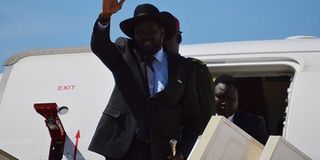For now South Sudan has no choice but to tolerate foreign economic domination

South Sudanese President Salva Kiir waves as he exits his plane upon arriving in Juba on May 11, 2014. FILE PHOTO | SAMIR BOL |
What you need to know:
- Absurdity of the situation: Only a quarter of its population can read or write, according to the UN.
- Openness is what gives Kenya its unique vitality; it is what has made this country the regional economic power.
The outrage in Kenya over South Sudan is understandable.
Even after Juba’s climbdown from the earlier order on foreign workers, feelings remain raw. But let’s not get carried away.
Hardly any country in our region is comfortable with outsiders controlling jobs and businesses.
Salva Kiir was only crudely acting out what others have done.
There is really nothing wrong with a government insisting its citizens get priority in the jobs and opportunities available. Everybody does it.
Those who were around in the late 1960s remember our own Kenya revoking licences to Asian dukawallahs who preferred to remain non-citizens.
Even defenders of Idi Amin insist his expulsion of Asians from Uganda was not an act of pure lunacy. The majority of them were British passport holders.
These days it’s all the rage in the region to talk about open borders under the aegis of the East African Community.
But essentially what the member countries are keen on is the removal of barriers to intra-state trade.
EDUCATED HUMAN CAPITAL
When it comes to the freedom of individuals to work or own property across borders, everybody, to some degree, clams up.
The absurdity of the South Sudan situation is the glaring shortage of educated human capital. Only a quarter of the population can read or write, according to the UN.
Those with professional qualifications are a very small fraction, and most prefer to remain overseas unless they are absorbed into the government.
The charity Medecins sans Frontieres reports that its efforts over time to recruit qualified South Sudanese midwives have not been successful.
For the time being, South Sudan has no option but to tolerate foreign economic domination.
Kenyans run its banking and insurance sectors and its hotels. Ugandans dominate the transport sector and also keep Juba supplied with food.
Something as basic as Juba’s water supply is controlled by outsiders, specifically Ethiopians and Eritreans.
Still, better endowed countries in the neighbourhood insist on their own tight controls.
In Ethiopia, retail and informal business is open only for citizens.
You won’t find a Kenyan or Ugandan or Tanzanian hawking or running a kiosk. Foreign workers are mainly confined to international organisations.
Regulations for investors in the financial sector in particular are very strict. That is why Kenyan banks like KCB and Equity that have an expansionist regional policy have been shut out of Ethiopia.
A visitor cannot even get a roaming mobile phone service in that country. You have to register a local SIM card.
Our close EAC neighbour, Tanzania, is not entirely hospitable to non-citizens either, as many Kenyans know.
Informal traders from outside are not encouraged (though depending on how “resourceful” you are, localised exceptions can be arranged).
An outsider owning land is out of the question.
There is a very elaborate version of Nyumba Kumi that can be fairly intimidating to transient traders and small investors from outside Tanzania.
Landlords are not allowed to rent out residential premises to aliens whose full details have not been supplied.
Everywhere there is a local commissar called mjumbe who must be informed of the length of stay of the visitor, what his work or business in the country is, and, of course, if he has all the proper government permits.
Occasionally, the mjumbe may saunter over to your premises to verify you are what you say you are.
Even locals who move from one province to another for employment must be reported to the commissar.
OPEN ENVIRONMENT
We Kenyans are lucky to live in a much more open environment where few questions are asked. Chaggas from Tanzania are thriving in the mitumba business at Nairobi’s Gikomba market.
We have resident Congolese and Rwandese importing and exporting all manner of unclear things.
There are thousands of South Sudanese living the easy life in our towns. There are nationals of Somalia in Eastleigh with fake Kenyan papers doing their thing. And many others.
All of which is a good thing, once we exclude the Al-Shabaab infiltrators and the Anthony Chinedus of the narcotics underworld.
What our neighbours fail to realise–with the exception of Uganda is that openness is what gives Kenya its unique vitality; it is what has made this country the regional economic power.
Twitter: @GitauWarigi





